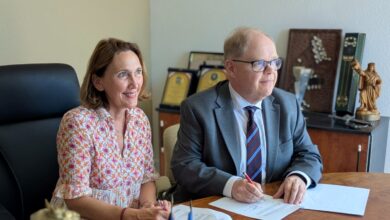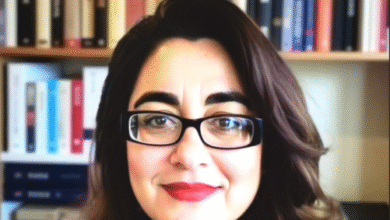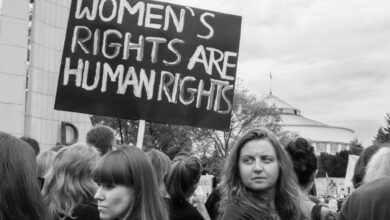Notre Dame Law School Global Human Rights Clinic Presents Human Rights Pedagogy at Midwest Clinical Conference | News | The Law School
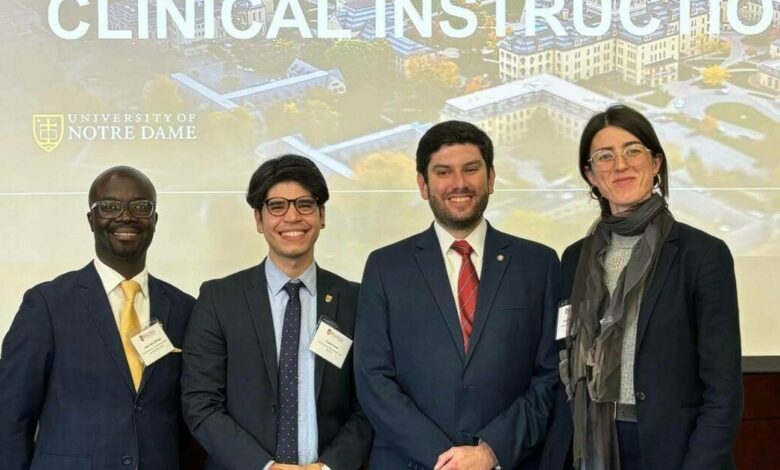
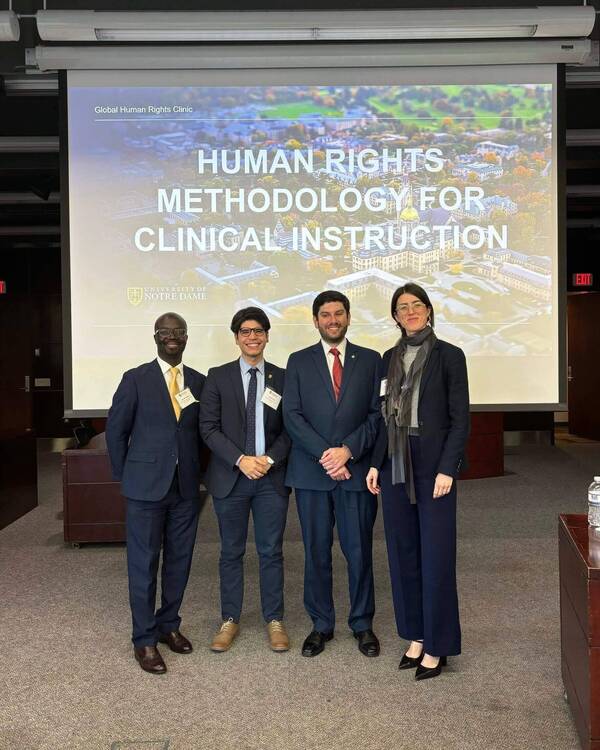
On Friday, November 8, staff attorney Jean Marc Brissau led the Notre Dame Law School Global Human Rights Clinic’s two legal fellows, Josemaría Rodríguez Conca and Irene Pamblanco Esteve, and research associate, Faisal Yamil Meneses, in presenting on the Global Human Rights Clinic’s distinct experiential learning practices and pedagogy aligned with our LL.M. in International Human Law Program, at the Midwest Clinical Conference hosted by University of Wisconsin Law School. It is the first time that the Clinic publicly discussed its methodology and pedagogy among clinical law scholars in the United States.
While the roadmap that the presentation followed was simple, the information provided was rich in detail and incredibly important. The session started by introducing the Clinic and the importance of its work. The presentation highlighted how students in the Clinic are trained in comprehensive fact-finding tools, broad evidentiary searches, and empathetic claimant support, helping U.S. legal clinics improve their approaches to investigating, verifying, and presenting human rights claims. The session also emphasized the importance of integrating human rights methodology into clinical instruction. There are nine core human rights treaties and over 100 international human rights-related treaties and agreements worldwide.
The second section of the presentation provided context of how global human rights law fits into the U.S. clinical legal education. The session did this by explaining the evolution and the key models of U.S. clinical legal education. It also described the internationalization of U.S. law clinics, particularly in the Global South, to address social justice and human rights issues while bridging the gap between theory and practice in legal education. The final part of this section outlined the need to evolve beyond Issue, Rule, Application, and Conclusion (IRAC) and to develop global legal skills.
The Clinic provided a case study example to highlight the methodology that would be used, the composition of the Clinic, and the usual partners associated with a case. The case study emphasized that the goal of the Clinic’s work is to promote effective human rights advocacy and enhance global legal skills. To achieve these goals, the Clinic takes on a collaborative approach, including J.D., LL.M., and J.S.D. students, undergraduate students, and graduate students. Outside of Notre Dame, the Clinic found partnership with UNICEF Innocenti, UN OHCHR, global law firms, and co-counsel arrangements.
At the end of the presentation, attendees were encouraged to implement the tools provided into their own clinics. The work that the Clinic has accomplished has shown that interdisciplinary methodologies strengthen students’ understanding of human rights. By preparing Notre Dame Law School students for more holistic lawyering, the Clinic aims to share its approach and inspire others to adopt similar practices.
Read key takeaways from members of the Global Human Rights Clinic team who attended the Midwest Clinical Conference.
“Leading the Clinic’s legal and research fellows in our presentation at the Midwest Clinical Conference on the Global Human Rights Panel was an inspiring experience. We shared insights on human rights methodologies and best practices in clinical instruction, emphasizing how human rights principles can enhance legal education. This collaboration highlighted the transformative role of hands-on human rights training in fostering a deeper understanding of global human rights issues and empowering the next generation of future advocates.” -Jean Marc Brissau, Staff Attorney, Notre Dame Law School Global Human Rights Clinic
“The GHRC, represented by Jean Marc Brissau (staff attorney), Faisal Yamil (research fellow), Irene Pamblanco (legal fellow), and Josemaría Rodríguez (legal fellow), attended the Midwestern Clinical Conference, presenting on human rights methodology for clinical instruction. Our presentation was well received by the attendees, who considered the clinic’s international approach innovative, as it was unique in this regard compared to other human rights clinics, which are immigration or U.S. focused. My experience at the conference was positive. It was attended by teams from various clinics in and out of the Midwest and had great presentations covering topics ranging from clinical teaching to jurisprudential developments, leading to a better grasp concerning clinical instruction in the U.S.” -Josemaría Rodríguez Conca, Legal Fellow, Notre Dame Law School Global Human Rights Clinic
Originally published by at ndlsglobalhumanrights.nd.edu on November 11, 2024.
Source link

